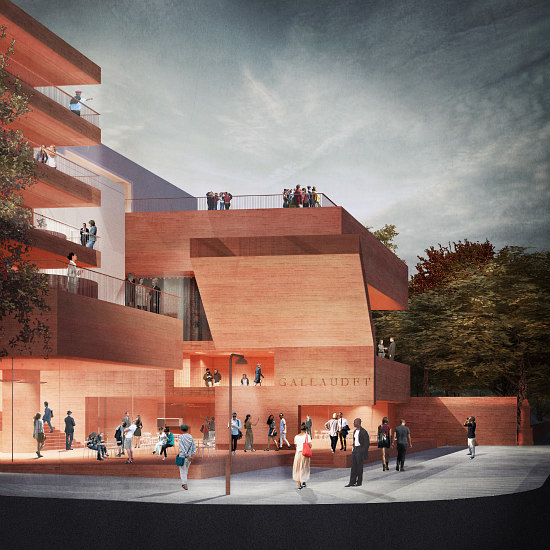What's Hot: Did January Mark The Bottom For The DC-Area Housing Market? | The Roller Coaster Development Scene In Tenleytown and AU Park
 DC's Shortcomings as a Deaf City
DC's Shortcomings as a Deaf City
✉️ Want to forward this article? Click here.

A rendering of a portion of Gallaudet's planned redevelopment.
Gallaudet University's presence in DC since the 19th century has earned the District a reputation as being a "deaf city". However, a recent discussion led by Deaf Urbanism revealed some of DC's shortcomings when it comes to living up to that name.
Last Friday, as part of PARK(ing) Day, urban planning advocacy group Deaf Urbanism hosted a parklet discussion on what constitutes a Deaf City and how urban planning and design could be improved with deaf-friendly features.
In recent years, the DeafSpace movement, birthed on Gallaudet's campus, garnered attention as a set of design principles that prioritize creating deaf-friendly buildings and spaces. "When you tease out ideas from Deaf people (and other disabled people), you actually get pretty radical ideas that work for a lot of people," says Matthew Sampson of Deaf Urbanism.
"There are a lot of barriers already for Deaf people, even in a city with a large deaf community, and with progressive politics," notes Sean Maiwald, a Masters of Public Policy student at George Washington University who worked with JBG-Smith on the upcoming 6th Street/Gallaudet development. "The biggest issues that we see are design and programming items. For example, narrow streets such as Florida Avenue are outright unsafe, especially for deaf people. Deaf people have specific space constraints which leads to one of the core approaches to DeafSpace - extra-wide hallways or walkways which allow the physical space to produce signs to communicate."
However, the root of DC's failure to incorporate design considerations that are more deaf-friendly starts at square one -- the language barrier that prevents grassroots engagement.
story continues below
loading...story continues above
"The more that I talked to other Deaf people about urban planning in DC, the more I recognized that there is tension between the Deaf and hearing worlds that plays out across city government," Sampson explains. "A lot of the problems revolve around interpreters and linguistic barriers. There can be no exchange if the language barrier continues to lay in place."
"Instead of advocating for accessibility/quality of life as an afterthought (after buildings are built and policies are implemented), being proactive and being a part of the city's development is the most sustainable way to benefit people of all abilities," vice president of DC Association of the Deaf Derrick Behm explains. "DCAD wants to promote language diversity in DC, specifically sign language because it benefits everyone and makes this city more progressive and unique."
But even if more people don't learn to sign, the barrier still needs to be addressed. Most of the time, the urban planning and development processes begin with civic engagement via community meetings hosted by local ANCs, ancillary city agencies, developers or smaller neighborhood associations. Rather than sign language interpreters being a default addition to these meetings, the onus is on Deaf individuals to contact the organizer of the meeting -- often within a certain timeframe -- to request interpreter services.
And even meetings where interpreters are expected don't always go as planned. On Tuesday evening, the District Department of Transportation (DDOT) hosted a meeting on Gallaudet's campus about planned streetscape enhancements on New York Avenue, but didn't have an interpreter present. Ultimately, Sampson, who is hard of hearing, had to step in and interpret for the audience.
The Deaf community's ability to put pressure on the city to make broader accessibility the standard is one of many concerns that Deaf Urbanism and other advocates hope to bring to the fore of the urban planning conversation.
"We want to see cities and spaces designed for people that interface with society differently, with universal design (and DeafSpace) from the ADA as a bare minimum standard," Maiwald explains.
See other articles related to: deafspace, gallaudet, gallaudet university, urban planning, urbanism
This article originally published at http://dc.urbanturf.production.logicbrush.com/articles/blog/dcs_shortcomings_as_a_deaf_city/13019.
Most Popular... This Week • Last 30 Days • Ever

As mortgage rates have more than doubled from their historic lows over the last coupl... read »

The small handful of projects in the pipeline are either moving full steam ahead, get... read »

The longtime political strategist and pollster who has advised everyone from Presiden... read »

Lincoln-Westmoreland Housing is moving forward with plans to replace an aging Shaw af... read »

A report out today finds early signs that the spring could be a busy market.... read »
DC Real Estate Guides
Short guides to navigating the DC-area real estate market
We've collected all our helpful guides for buying, selling and renting in and around Washington, DC in one place. Start browsing below!
First-Timer Primers
Intro guides for first-time home buyers
Unique Spaces
Awesome and unusual real estate from across the DC Metro













